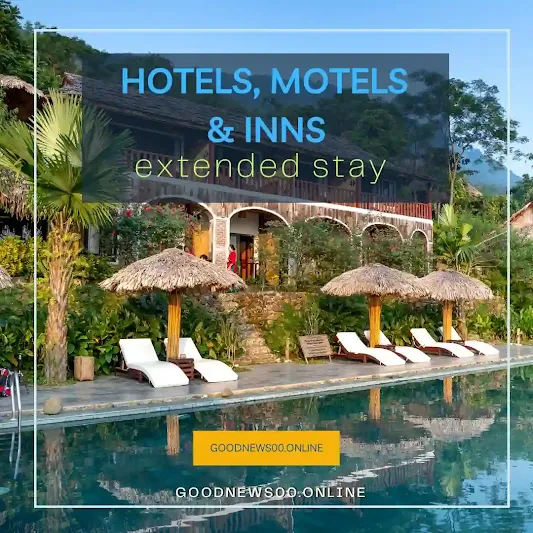Hotels, Motels, and Inns: Extended stay
Long-term stay hotels and extended-stay hotels are similar terms. These are helpful for those who must stay for a week or longer, such as businesspeople on lengthy travels, families on vacation, or persons looking for more permanent housing.
Hotels are a business that offers short-term, compensated lodging. A hotel room's interior amenities might range from a modestly good mattress in a tiny room to enormous suites with bigger, better-quality beds, a dresser, a refrigerator, other kitchen appliances, upholstered chairs, a flat-screen television, and en-suite bathrooms. Smaller, less-priced hotels may offer the most basic amenities and services to their guests.
Additional guest amenities
offered by larger, more expensive hotels could include a pool, a business center with computers, printers, and other office supplies, childcare, conference, and event spaces, tennis or basketball courts, a gym, restaurants, a day spa, and social function services. For customers' convenience, hotel rooms are frequently numbered (or named in certain smaller hotels and B&Bs).
The medieval inn
was the forerunner of the modern hotel. Starting in the middle of the 17th century, coaches could stay at coaching inns for nearly 200 years. Around the middle of the 18th century, inns started to serve more affluent customers. In Exeter, one of the first hotels in the contemporary sense opened its doors in 1768. There were several hotels in Western Europe and North America around the beginning of the 19th century. Luxury hotels started to appear in the latter half of the century, particularly in the United States like Marriott Hotels
Extended stay
Hotel operations can range in size, focus, complexity, and cost. Most hotels and prominent hospitality organizations have created industry standards to classify various hotel types. Luxury facilities, full-service lodging, an on-site restaurant, and the greatest level of individualized assistance, such as a concierge, room service, and clothes-ironing staff, are all features of an upmarket full-service hotel facility.
Hotels near Disneyland
addition to numerous full-service rooms, an on-site full-service restaurant, and a number of other on-site amenities, full-service hotels frequently have luxury full-service facilities. Smaller, independent, non-branded hotels known as "boutique hotels" frequently have luxury amenities.
Small to medium-sized
Hotels only provide a few amenities on the premises. Small to medium-sized hotels known as "economy hotels" provide minimal to nonexistent services in addition to basic lodging. Small to medium-sized hotels that provide longer-term stays are called extended-stay hotels.
A type of property ownership including the ownership of a specific lodging unit for seasonal use is timesharing and destination clubs. A motel is a modest, low-rise accommodation with direct access from the parking lot to individual rooms. Boutique hotels often have a distinctive setting or a cozy atmosphere. Many hotels and motels have made their way into people's minds through popular culture. Some hotels, like casinos and vacation resorts, are constructed explicitly to serve as destinations.
Cheap hotels near me
The majority of hotels are managed by a general manager who serves as the chief executive (commonly referred to as the "hotel manager"), department heads who are in charge of particular areas of the hotel, such as food service, middle managers, support employees, and line-level supervisors. The organizational structure, number of employment positions, and hierarchy vary depending on the size, purpose, and class of the hotel and are frequently decided by the hotel ownership and operating firms.



Comments
Post a Comment